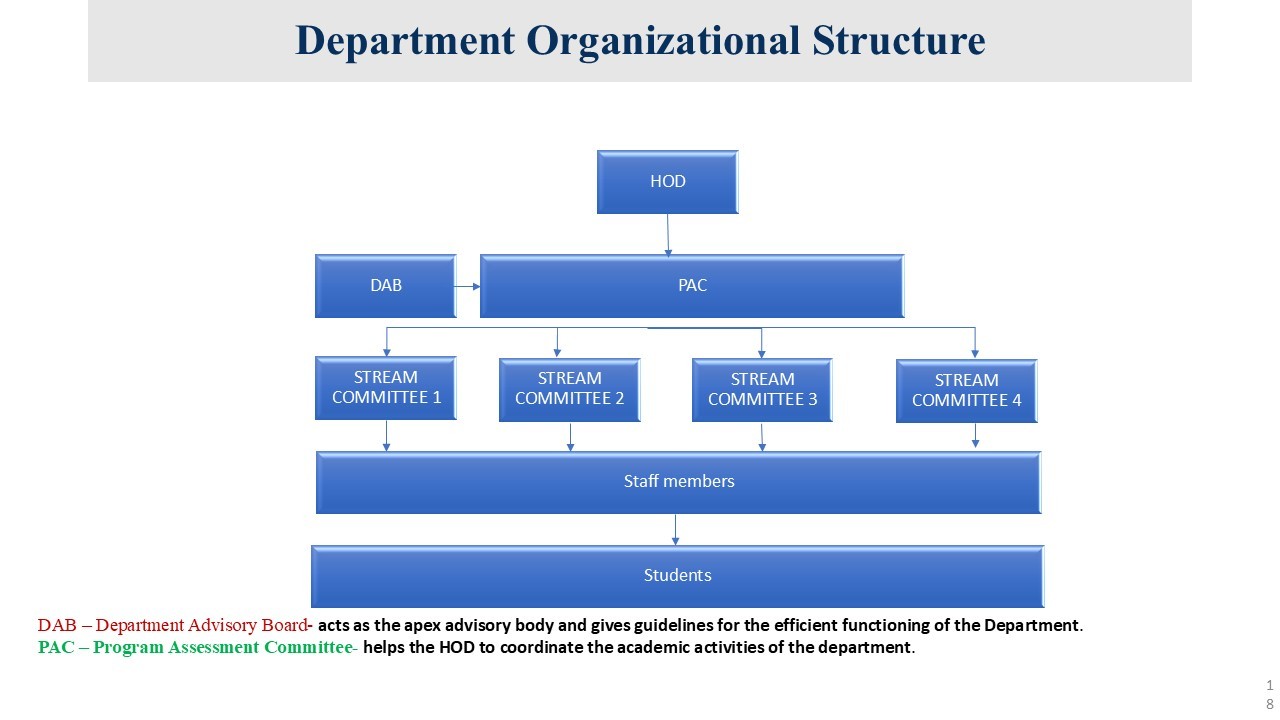About the Department
The Department of Electronics and Communication Engineering was started during the inception of the institute, in the year 1995. The department grew into a full-fledged one, with two B.Tech batches, in the year 2001. The annual intake for the undergraduate programme is currently 120 students.
The Department offers minor in Artificial Intelligence, Mechatronics etc to facilitate the students to get a B.Tech Degree in Electronics and Communication Engineering with minor in the specified course. The department also offers Honours degree in Electronics and Communication Engineering.
Two Postgraduate programmes – 1. M.Tech in Automotive Electronics in collaboration with TATA ELXSI (30 seats), 2. M Tech in Signal Processing (18 seats). The department has been an approved research centre under APJ Abdul Kalam Technological University (KTU) since 2016 and high-quality research work in areas such as holographic storage system, optical communication, optical fiber sensors, nanomaterials and devices, machine learning, secure communication and data processing, wireless communication and biomedical signal processing is carried out in the department.
"Nanoelectronics and Materials Research Lab" was set up utilizing the Plan fund of Rs. 1 Crore, allotted by the Govt. of Kerala, in the financial year 2021–22 and "Innovation Centre for IoT and Wireless Communication," for the same amount in the financial year 2022-23. Govt. of Kerala has also allotted Plan fund of Rs. 1 Crore each to set up an “Innovation Centre for Biomedical Research” and “Robotics and Machine Learning Lab” in the financial year 2023 – 24.
The focus of the department is to produce graduates and post-graduates with strong fundamentals in the electronics and communication domain with knowledge of the latest technologies in use in the industry, so that they can meet the upcoming challenges in the field. The undergraduate programme provides a strong foundation in the fundamentals of engineering and science. A variety of electives, Minor and Honour courses give the student an insight about the latest advancements in the field. With a firm grounding in the basics, the students are well prepared for both post-graduate studies and the high-tech corporate environment.
The ECE department has some of the finest faculty members in the state who are highly qualified, experienced and dedicated, with a strong commitment to the advancement of knowledge among the students. The faculty has expertise in various fields of Electronics & Communication, like Signal Processing, Image Processing, Applied Electronics, Communication Systems, VLSI & Embedded Systems, Optoelectronics, Microwave Engineering, Network Security, Nanoelectronics, MEMS, Machine Learning, to name a few. The department organizes several national and international conferences, seminars, workshops, faculty development programmes and community development programmes for the benefit of students, faculty and society.
The B.Tech programme in ECE has accreditation till 2025. The department was certified by the International Organization for Standardization under ISO 9001:2000 and has been selected for the first phase of World Bank aid under TEQIP. The department has consistently produced toppers in the university examinations and the majority of final year students are recruited by leading organizations every year. A large number of our alumni are pursuing higher studies in premier institutions like IISc, IITs, NITs and IIMs in India and in reputed Universities abroad.
The department takes initiatives to impart entrepreneurial skills to students and to update them about the recent technological advancements and the recent work going on in different fields of research. In order to achieve this goal, students are encouraged to interact with the industry by doing final year projects, training, internships etc., in collaboration with the industry. The department arranges expert talks on various topics by eminent industry professionals to create an awareness of the modern technology in use in the industry and the current advancements in research. The department has MoUs with various companies to strengthen the relationship and give better exposure of the industrial environment to the students.
Vision of the Department:
To be a centre of quality education and research in the field of Electronics and Communication Engineering, to mould socially responsible engineering professionals
Mission of the Department:
To provide quality education ensuring systematic teaching-learning process.
To create an ambience to promote and foster research, entrepreneurship and industry interaction.
To impart value-based education to prepare students to become socially committed engineering professionals.
Ranking & Statistics
Statistics
532/6/10
Students (UG/PG/PhD)
56
No. of students placed
9
(Last 4 Years)
SCIE Journal Publications
12
Conference Publications
4
(Last 4 Years)
Funded Research Projects
PROGRAM EDUCATIONAL OBJECTIVES (PEOs)
PEO1: Pursue higher education and research, motivated in lifelong learning.(Knowledge)
PEO2: Engage in design, development and testing of systems in the field of electronics and communication engineering.(Professional competence)
PEO3: Work as competent engineers in a team involving core/ interdisciplinary projects.(Interpersonal skill)
PEO4: Use engineering skills to adapt technology for the betterment of the society.(Entrepreneurship)
PROGRAM SPECIFIC OUTCOMES (PSOs)
PSO1: Apply the concept of discrete electronics and solid state engineering in the analysis and design of VLSI and nano level electronic systems, based on recent research in these areas.
PSO2: Apply the fundamental concepts acquired in the field of communication for solving real world engineering problems in next generation communication and IoT systems.
PSO3: Motivate/ inspire students to implement their skills learnt in signal processing to solve real world problems by integrating machine learning techniques.
Industry Interaction
MoU with Airports Authority of India, Ministry of Civil Aviation, Government of India.
MoU with BSNL Regional Telecom Training Centre.
MoU with Maker Bhavan Foundation, USA.
MoU with Centre for Development of Advanced Computing (CDAC).
MoU with Kerala Automobiles Limited (KAL).





